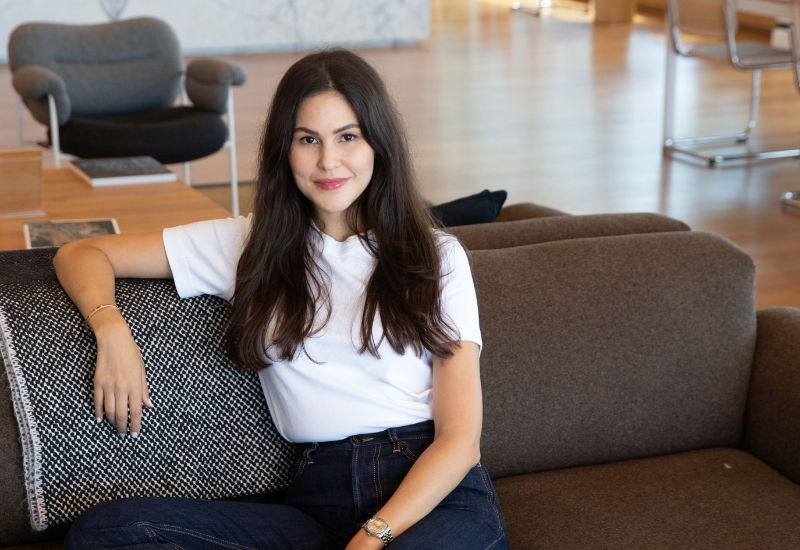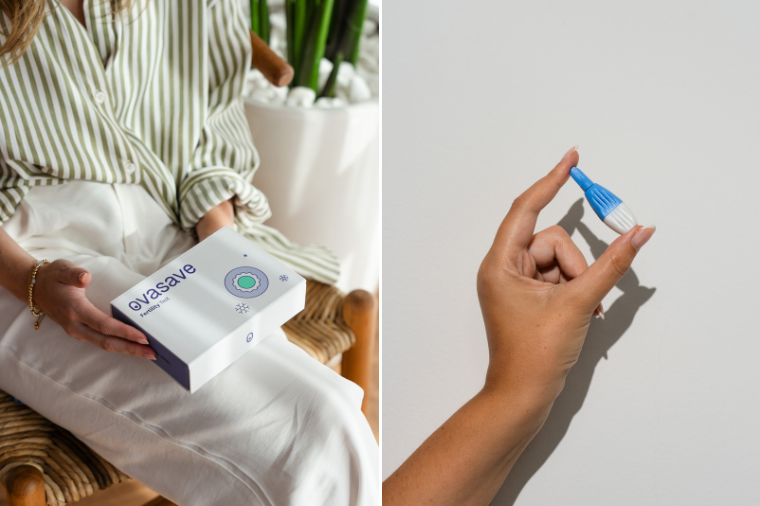As more women are looking to conceive in the Middle East at and older age, knowing the key factors that affect fertility are of utmost importance.
A newly launched at home testing kit Ovasave has done all the research and partnered with the best fertility clinics to create all-inclusive egg freezing packages for incredible women like you who want to keep their options open.
Co-founder of Ovasave, Torkia Mahloul, is passionate about fertility preservation, educating women about their bodies and using tech to empower women to achieve their goals.
To delve into the topic of fertility, Emirates Woman spoke to Mahloul, who is a tech expert with over a decade of experience in banking, technology and fintech.
What inspired you to launch Ovasave?
My journey to launching Ovasave is deeply personal, rooted in my own struggles with fertility. It began at age 34, when I came face to face with the need to preserve my eggs. Like many women, I was initially unaware of where to start or how to navigate the complex world of fertility care. The pivotal moment came when I took an AMH test, which highlighted the importance of fertility testing and understanding our bodies. During this journey, I met Majd Abu Zant, who would later become my co-founder. Together, we recognized a gap in women’s healthcare and were driven by a common belief that women deserve access to information, support, and affordable care. Our mission at Ovasave is to empower women to proactively manage their fertility and hormonal health — not reactively, which can often be “too late” — ensuring every woman has the chance to make informed decisions about her reproductive future.
View this post on Instagram
Talk us through the product and how does it work?
Our platform is designed to simplify the fertility journey for women, covering everything from initial hormone testing to accessing fertility healthcare. Women can order our AMH test kit from our website and have it delivered directly to their door. The process involves a simple finger prick to collect a few drops of blood (which can also be done by a phlebotomist if someone is uncomfortable doing it herself) . A courier then collects the sample and delivers it to our accredited lab for analysis. It’s important to highlight that the convenience of our at-home sample collection doesn’t come with any tradeoff in quality or reliability. Our lab tests maintain the same level of accuracy as those conducted in clinics. Within just a few days, women can securely access their results through their Ovasave dashboard. They also have the option to schedule a free tele-consultation with a fertility expert to discuss their results and consider their options. Going beyond convenience, we also want to make fertility care more affordable. Our AMH test and teleconsultation services are priced at a fraction of the cost of traditional clinic visits. Similarly, for women considering egg freezing, we are partnering with leading fertility clinics in the UAE to offer comprehensive egg freezing packages along with payment plans to help ease the financial burden.
What are the key factors that can affect fertility?
One of the primary determinants is age. As women age, their fertility declines, particularly after the age of 35— mainly due to a decrease in both the quantity and quality of eggs in the ovaries. By educating women about the impact of age on fertility and promoting early testing, we empower them to make informed decisions about family planning and reproductive health. In addition to age, certain medical conditions can also affect fertility. For instance, polycystic ovary syndrome (PCOS) and endometriosis can disrupt ovulation and interfere with conception. By raising awareness about these conditions and their impact on fertility, we hope to provide women with the knowledge they need to seek timely medical intervention and support. Lifestyle factors can also play a significant role in fertility. Smoking, consuming a lot of alcohol, poor diet, and high levels of stress can all contribute to infertility. By encouraging healthy lifestyle choices and providing resources for stress management, nutrition, and overall well-being, we empower women to optimize their fertility potential.
What are your key tips to maintain a healthy lifestyle?
I’ll explain this through the lens of reproductive health. You can think of your ovaries and your eggs as any other part of your body in terms of how they age, but unfortunately they age even faster than the rest of your body. That’s why leading a healthy lifestyle at all levels is key to slowing down the aging process. It starts with the obvious things like nutrition,maintaining a clean, balanced diet and regular physical activity. With our busy schedules it is sometimes difficult to make time for exercise but I would recommend just choosing an activity that you enjoy and try to incorporate it in your routine several days a week. The things that are often overlooked, however, are sleep and stress management — and these two things are super important. Stress is especially critical because too much cortisol (the stress hormone) in your body can disrupt other hormones and create imbalances that directly affect your reproductive health. I know first-hand that going through any fertility treatment can affect you mentally and emotionally. This is normal and this is why it is also critical to look after yourself, ensure that you are getting enough sleep and a good support system around you. And if you are struggling with this, I believe that you should not hesitate to get the help of a professional therapist.

How can one boost their fertility?
We just mentioned that leading a healthy lifestyle is a good way to look after your fertility and overall health. If you are trying to conceive or preparing for an egg freezing / IVF cycle, there are a number of supplements that you can take to support your fertility. You can take folic acid, which plays a crucial role in cell division and DNA synthesis, which are both important for egg health. Omega-3 fatty acids are another important nutrient for fertility. These healthy fats can help regulate reproductive hormones and improve egg quality. Coenzyme Q10 (CoQ10) is another supplement that is known to support fertility, particularly for women over 35. CoQ10 has powerful antioxidant properties that can help protect eggs from damage. Some studies suggest that CoQ10 supplementation may improve egg quality and increase the chances of conception, especially for women undergoing fertility treatments such as egg freezing and IVF. Lastly, getting enough vitamin D has been linked to improved reproductive outcomes, while deficiency has been associated with infertility. Simply spending time in the sun and eating vitamin D-rich foods can help. However, people who don’t get enough sun exposure or lack vitamin D in their diet might need to resort to supplements.
At what age would you recommend freezing your eggs?
The younger the better — and this is indisputable. The ideal age to freeze eggs is typically between the late 20s and early 30s. This is when the eggs are of the highest quality and quantity, which means better chances of successful future pregnancies. While many women don’t even consider egg freezing until their mid to late 30s, starting earlier can provide more flexibility and potentially higher success rates when the eggs are put to use in future fertility treatments.
How can female infertility be treated?
Infertility comes in many forms and can have different root causes so it is difficult to provide a one-size-fits-all solution or treatment.That’s why testing is critical for every woman to understand her own unique situation and plan accordingly with the help of fertility experts. Egg freezing is a way to preserve your fertility especially if you have a low ovarian reserve (i.e. fewer eggs than you should have for your age). IVF is another solution for couples who are struggling to conceive. The key takeaway is that the more proactive you are about understanding and preserving your fertility (before issues arise), the better your chances are for a positive outcome. Every situation is unique and we highly recommend discussing it with a fertility expert.
What are the best tests to have done for women below 35 years?
If you are not trying to conceive now and are not experiencing any specific hormonal symptoms, then the must-do test is AMH, which stands for anti-Mullerian hormone. It is a simple blood test that gives you a read on how many eggs you have left. If your concern is more related to your overall hormone health, we are soon launching our fertility and hormonal panel test which covers 7 hormones (AMH, LH, FSH, TSH, Estradiol, FT4, Prolactin) and provides insights into conditions like PCOS, thyroid disorders, diminished ovarian reserve and peri-menopause.
What are some of the key concerns that women in the Middle East face when it comes to conceiving?
When we look at the Middle East and North Africa (MENA) region, one of the pressing issues is a significantly higher infertility rate, which stands at about 50 percent higher than other parts of the world. It’s a complex issue with several factors at play, but one glaring aspect is the lack of education and awareness surrounding fertility and women’s health in general. Unfortunately, this lack of awareness often leads to a reactive approach, where women only seek help after they encounter difficulties conceiving or face complications along the way. Instead of this, we should adopt a proactive approach — and this is where Ovasave comes into play. By taking proactive measures such as early fertility testing, women can get crucial insights about their reproductive health. We’re also striving to normalize conversations about fertility, creating a supportive community where women can openly share their concerns and experiences. This early awareness empowers them to explore various options and make informed decisions about their fertility journey. It’s about providing women with the freedom to choose their path moving forward.
– For more on luxury lifestyle, news, fashion and beauty follow Emirates Woman on Facebook and Instagram
Images: Supplied












